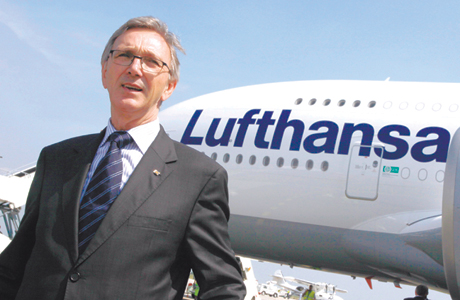Business
Lufthansa on a high with A380
(China Daily)
Updated: 2010-09-03 15:03
 |
Large Medium Small |
|
 Wolfgang Mayrhuber, chief executive officer of Deutsche Lufthansa AG, poses next to an Airbus A380 during a news conference at the Internationale Luftfahrt Ausstellung (ILA) air show in Berlin on June 8, 2010.
Michele Tantussi / Bloomberg
|
BEIJING - Europe's largest carrier Lufthansa AG started flying the Airbus A380, the world's largest aircraft, between Beijing and Frankfurt on Thursday to cater to strong demand in the world's fastest growing aviation market.
The German carrier became the second foreign airline to fly the A380 to China, following Emirates Airlines last month.

The plane, which bears the name Beijing, is the German carrier's third A380 from the 15 super jumbo aircraft it ordered from Airbus.
Lufthansa Chief Executive Officer Wolfgang Mayrhuber said that the flight was a "major milestone" in the relationship between Lufthansa and China
About 7,000 passengers fly every week between China and Europe, according to statistics from Lufthansa.
The double-deck A380 can seat up to 526 passengers, 140 more than the Boeing 747 which currently serves the route on a daily basis.
The A380's main deck is the same size as a Boeing 777-200 while the upper deck is equivalent to an Airbus A340-300.
The aircraft will initially fly to Beijing on a weekly basis and Lufthansa plans to gradually increase the frequency of this service in coordination with Chinese authorities.
"After using the A380, Lufthansa can significantly increase its capacity in China without launching new routes in the world's fastest growing air market," said Li Lei, an aviation analyst with Citic China Securities.
International air travel to and from China has recovered strongly this year due to the country's robust economic growth.
Chinese airlines carried 1.76 million passengers on international routes in July, surging 43.9 percent year-on-year, according to data from the Civil Aviation Administration of China.
The International Air Transport Association said international scheduled traffic statistics for July showed a continued strengthening of demand for passenger and cargo flights.
International passenger demand grew 9.2 percent year-on-year in July while international scheduled freight traffic showed a 22.7 percent improvement. Asia-Pacific carriers outperformed the industry average with 10.9 percent growth in July.
Lufthansa currently generates about 20 to 25 percent of its income from the Asia-Pacific region, Mayrhuber said. The Chinese market accounts for 25 percent of its Asia-Pacific revenues, according to earlier data issued by the company.
Emirates wowed the Beijing market last month when its A380 landed with luxurious facilities, such as a shower spa in the first-class cabin.
But Mayrhuber said convenience is more important than luxury. "Business travelers need quiet to relax themselves," he added.
Therefore, its first-class cabin is equipped with sound-absorbing curtains, special sound-insulating materials in the aircraft's outer skin and sound-absorbing carpeting.
China Daily